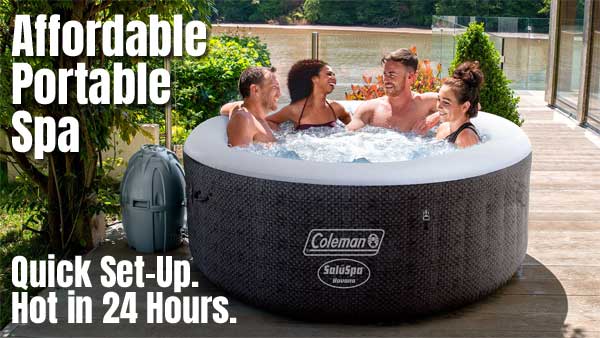Do inflatable hot tubs really offer any health benefits? You may have read that jacuzzis can boost blood flow, reduce stress, improve sleep or alleviate muscle and joint pain – but are those claims true? Let’s get the answers on the actual hot tub health benefits…

4 Hot Tub Health Benefits:

1. Improved Circulation
First of all, when you immerse your body in warm water, your muscles relax. As a result, your blood vessels dilate, so blood flow can increase to all areas of your body. Consequently, this helps to reduce muscle tension and promote relaxation, which can lower stress levels.
2. Better Sleep
Second, jacuzzis help to raise your body temperature. Then, when you exit the tub, the body cools down rapidly. This cooling process can trigger melatonin release, which helps with sleep. Therefore, relaxing in a spa before bed may assist with falling asleep and staying asleep.
3. Sore Muscle Relief
Third, spas have shown to relieve muscle and joint pain. For instance, warm water soothes sore muscles, while water buoyancy reduces pressure on our joints.
Also, soaking in warm water after exercise has shown to decrease lactic acid buildup in the muscles that occurs when you workout. In addition, the heat increases blood flow, thus reducing inflammation and speeding up healing.
4. More Health Improvements
But the benefits don’t stop there. Soaking in hot water can even help with arthritis, fibromyalgia and diabetes. For example, in one study (in the N.E. Journal of Medicine), 10 patients with type 2 diabetes soaked in a hot tub for 30 minutes a day, 6 days a week for 3 weeks.
Compared to a “no hot tub” control group, the patients showed a significant reduction in fasting blood glucose levels and an improvement in insulin sensitivity.
Hot Tub Risks:

While hot tubs can have numerous health benefits, they can also pose some potential risks, including dehydration. The higher heat causes us to sweat, which can dehydrate us if we don’t replenish with water.
In addition, if we hang out in the spa too long, our body temperature may rise to a level where it’s not really healthy. Consequently, we can feel dizzy, nauseous or even light-headed to the point of fainting. To avoid overheating, spend 15-20 minutes at a time in your spa, especially when you start.
Finally, hot tubs can harbor bacteria, especially if they aren’t cleaned properly or if the water isn’t treated with the appropriate chemicals. To avoid infection, make sure to regularly test and treat the water per the manufacturer’s instructions.
Save Money with an Inflatable Spa:
While hot tubs offer numerous health benefits, they can also cost a significant amount of money. However, inflatable spas can provide the same advantageous health benefits as traditional jacuzzis, but you don’t have to pay as mush money.
Blow-up spas are also easy and quick to set up, and they can fit well in small spaces. Not to mention, they’re portable. In other words, there are several reasons to like them more than a regular in-ground or hard-shell spa.
If you’re interested in the health benefits of hot tubs but don’t want to pay $5,000-$10,000+, inflatable spas offer a money-saving alternative. I love having my hot tub because I get to enjoy warm water therapy in the privacy and convenience of my own home. Plus, I can use it for entertaining and relaxing with my friends too.

